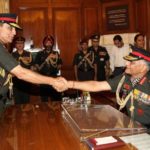 General V.K. Singh assumed charge as India’s new Army Chief last week. Though appointment of Army Chiefs in India does not attract as much media, the trend is gradually changing. The Indian Army continues to remain apolitical but has gained greater visibility in the public domain recently. Comments by military men and issues of corruption have put the military under media glare. Rarely has the war strategy of the Indian Army received so much attention in the media as it did after former Army Chief Deepak Kapoor’s comment on the ‘cold start’ doctrine.
General V.K. Singh assumed charge as India’s new Army Chief last week. Though appointment of Army Chiefs in India does not attract as much media, the trend is gradually changing. The Indian Army continues to remain apolitical but has gained greater visibility in the public domain recently. Comments by military men and issues of corruption have put the military under media glare. Rarely has the war strategy of the Indian Army received so much attention in the media as it did after former Army Chief Deepak Kapoor’s comment on the ‘cold start’ doctrine.
Several opinion pieces highlighting the challenges confronting General Singh have appeared in the mainstream media. There are two approaches for handling the task at hand. Strategic analyst C. Raja Mohan advises for the continued apolitical nature of the Indian military but argues for a pro-active role. Lt. Gen. Vijay Oberoi (Retd.), former Vice-Chief of Indian Army, calls for an activist role for the army which challenges the institution’s apolitical nature.
According to Raja Mohan, General Singh will have to check corruption in the Indian Army for the purpose of retaining public confidence and present the army as an attractive career option for young Indians. Civilian control of the Indian military has raised concerns about the role of the Army in contributing to the national security policy. Raja Mohan is insightful in suggesting that, “…resentment within the army and the other armed services is mounting at the perennial short shrift they get from the civilian bureaucracy, where the capacity to manage the nation’s military appears to be eroding rapidly. The answer to this lies in the army improving its institutional capacity to frame policy issues, to engage other governmental agencies, and to better communicate with the public — rather than the occasional public venting by the chief.” Raja Mohan is of the view that Army’s political neutrality does not imply passivity on issues of security policy debate. “Civilian primacy over the military in our democracy does not mean that the chiefs of our armed forces have to be mute in the face of persistent neglect of national defense by incompetent bureaucrats and indifferent ministers. If he can make the army’s case calmly and in a sustained fashion, within the government and to the public, the new chief can make a huge difference to the national discourse on defense policy.”
Lt. General Oberoi’s suggestion on similar issues is markedly different. He raises concern over issues of military modernization and dwindling morale of the armed forces. But his revisionist views on the apolitical role of the army are alarming. Lt. General Oberoi makes a case similar to the one highlighted by Raja Mohan when he refers to the limited role of the army in shaping the country’s security policy; but he has a different suggestion take on the issue. According to Lt. Gen. Oberoi, “However, in India, the military has been deliberately kept out of the policy formulation loop and even after over six decades of loyal, patriotic and dedicated service to the nation, it is obvious that it is still not trusted!”
The apolitical nature of the army is attacked by Lt. Gen. Oberoi in direct terms, “The military also needs to modify the concept of being apolitical. The army’s long standing stance of keeping a distance from the leaders of political parties other than those of the party in power needs to be modified. In a parliamentary system like ours, policy is formulated by all parliamentarians despite differences of the opposition. After all, the Parliament Standing Committee on Defense and similar other committees are all-party bodies. Consequently, though remaining apolitical, the army needs to apprise and discuss its concerns with the political leadership across the board. This would not reduce the apolitical nature of the army, about which it is justifiably so proud.”
Divergence between Raja Mohan and Lt. Gen. Oberoi’s suggestions stem from the problem of defining the term ‘apolitical’. Stephen P Cohen in his seminal work on the Indian army asserted that India’s armed forces readily accept their apolitical role—the problem is about who precisely defines the meaning of military and political. Are public statements on feasibility of strategic policy by the military fostering discussion or is it violating the segregation of military and political roles?
While it is important that the Indian military continues its apolitical leanings, views of the senior military men should be appreciated in the light of the fact that experience and expertise of the military personnel can positively contribute to public dialogue and a well-informed national strategy.